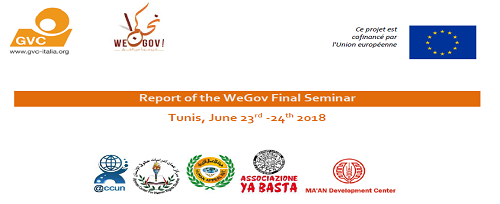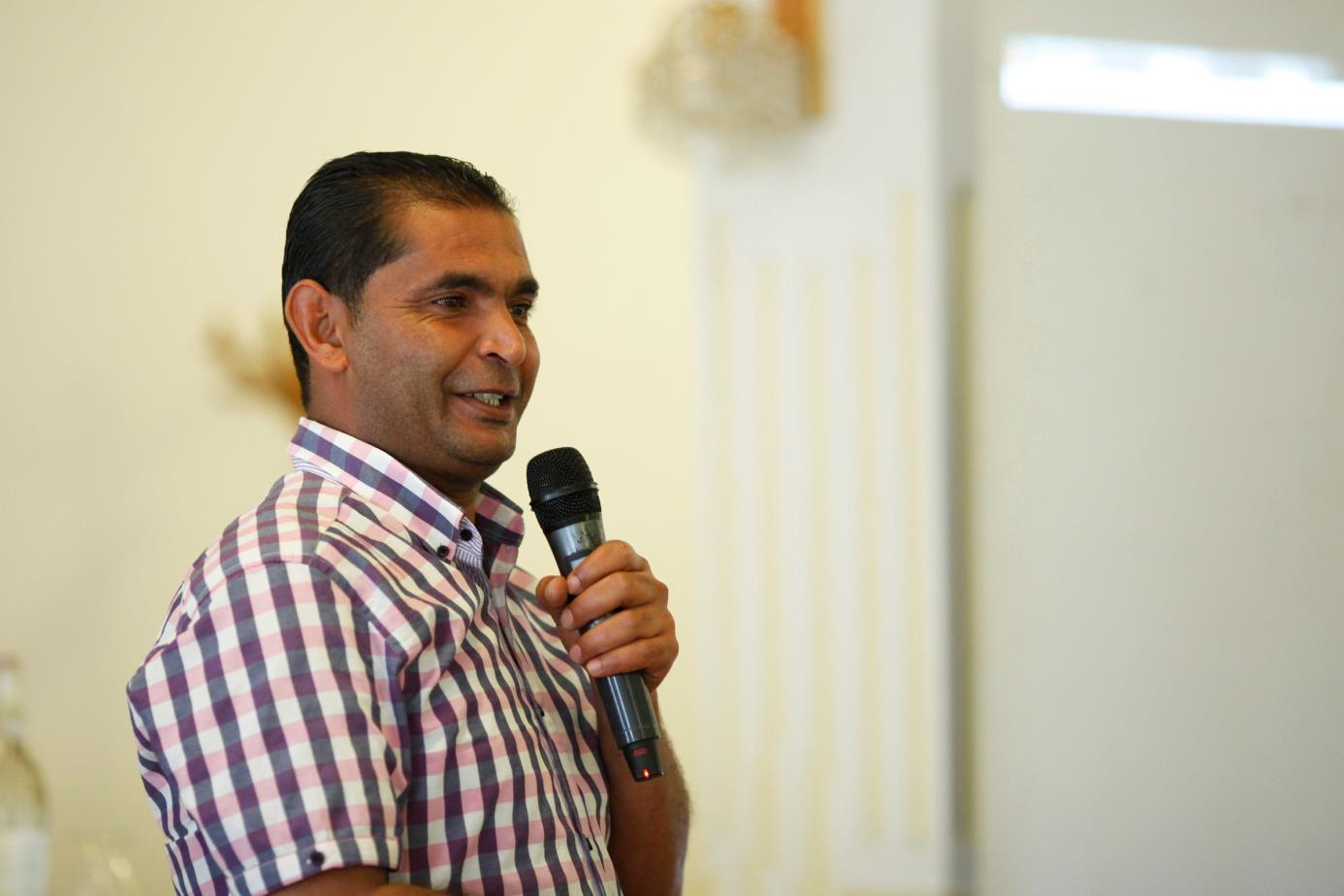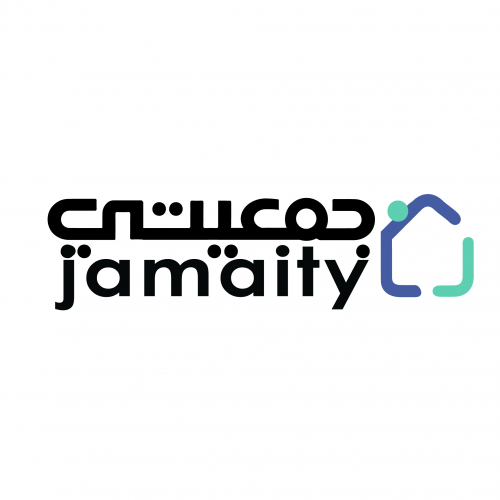WeGov is a 3-year regional project, cofinanced by the European Union, implemented by the Italian NGO GVC with its partners MAAN and HAI (Palestine), ACHRS (Jordan), ACCUN (Tunisia) and YaBasta (Italy). The overall objective of the project was to contribute to building a favourable environment aimed at achieving inclusive, democratic and sustainable development in Jordan, Libya, Palestine and Tunisia, by promoting the involvement of CSOs. As the project was coming to an end, the final seminar was the opportunity to present the project’s outputs and achievements, including those from the projects of the 15 CSOs which received a subgrant. It was also the opportunity for all the project partners from the 4 countries to meet and share their best practices and lessons learnt on citizen and civil society participation.
Below is a summary of the different sessions of the final seminar.
Expert presentations:
Public governance (Mr Karim Ben Kahla)
Governance is a tool to set limits, a mechanism to frame the field of actions of decision-making centres. It is about setting limits to power, decentralizing, and not giving more power. It is the management of management.
The literal definition of governance defines the relationship between superior and inferior actors. Whereas, in reality, there rarely is an ordering party. The broader definition hence includes different groups of interest (employees, unions, clients, providers,…). Governance then becomes a system of relationships and communications between the different groups of interest. The end product of these relationships would then be trust, within and among the organizations.
Good governance would then be a better management of power, following two main principles: respect of the interests of the different groups involved and avoid abuses of power.
To do so, certain myths must be clarified: transparency, participation and accountability alone do not lead to good governance. A structure and set of values need to be practiced. For instance, the respect of contracts is a major component, but also inclusion, representation, participation, conflict management, fairness, leadership and communication. Furthermore, in order to avoid abuses, integrity, transparency, accountability, competition, durability, justice, knowledge management and precautions are also essential.
Role of civil society on the local level (Mr Mondher Bousnina)
Some key issues related to local governance are:
- when we vote for local officials we need to bring people together; municipalities need to give gradual power to local communities.
- local communities are not used to work with government, the gap is being bridged over the past years to work on decentralisation projects.
- municipal revenues are very low in Tunisia compared to other countries (4% vs 10-30% of the national budget). INGOs should help by bringing revenues because municipalities are going bankrupt preventing them from implementing programs.
The lack of internal auditing and autonomy of spending in municipalities led to 274,5 billion dollars being available but not spent. Furthermore, in order to overcome the financial difficulties, communications between communities should be improved allowing resources to be shared more freely (ex. common markets, vehicles, …).
The key here seems to reside in not only funds, but mainly in the support and empowerment of human power to localities. This would prevent the circumstances faced today, where for example only a handful of architects and engineers work outside of big cities.
The development index is suggested as a tool to allocate funds in accordance to local needs. Fairness, and not equality is necessary to respond to the needs of the least developed municipalities.
Participation: research, analysis and advocacy
Presentations of projects by:
- Irada Tozeur (Tunisia)
- Motivators for Training (Jordan)
- Impact Foundation Gafsa (Tunisia)
Debate
Researchers should work with field project executives and research should not be disconnected from concrete work in the field. CSO must play an intermediary role between research centres, donors, the private sector and local communities in order to enhance local development and push forward the multiple interests involved. A lot of work is still needed to bring closer the different actors.
It is important to question ourselves on the enrolment and participation of academics and the public administration in local projects, given the importance of local appropriation by all actors. But the question remains if academics are actually interested and open to a more collaborative relationship, and if research centres have the necessary resources. Because for now, many international and local research centres do not share their results to local communities. Furthermore, research centres are often located very far away from field workers, which is a major obstacle. There is indeed a great need for tools and forums in order to share information and knowledge between researchers and CSOs. The role of CSOs tends to include more and more the vulgarization and sharing of studies.
A major issue in Arab countries is the limited culture of access to information. Not only legislations need to change, but also the culture and ways of doing, because it happens too often that executive powers refuse to address or publish certain topics in fear of destabilizing public order: even if access to information laws do exist, they are often not enforced.
There is a strong desire to use new technologies for advocacy purposes, but other problems emerge in relation to human and technical resources with the lack of expertise and materials available. It all depends on competencies and capacities, as well as preferences of the target groups: if it is the youth then social networks are the best channel, but if we are targeting public institutions then traditional means are more suitable. The main objective for now remains to gain more knowledge on the different and more modern ways of doing advocacy.
Participation: monitoring of funding and services
Presentations of projects by:
- Irada Ksar (Tunisia)
- Land Defence Coalition (Palestine)
- Election Network in the Arab World (Jordan)
Debate
This panel was initially directed towards monitoring of public financial expenditure and services, however it was later generalized to monitoring public policy in three of its formats: expenditure of development funds, access to services, and legislative reform.
Monitoring of public policy is key in two phases: immediate, as a form of accountability, and future improvement of the process of public policy implementation.
Two important issues at stake are how to generalize experiences of monitoring and influence on public policy, in different regions and sectors, through knowledge sharing and developing tools; and the relationship between the State and civil society in terms of questioning whether civil society is replacing the State and contributing to sustaining the status quo.
The final debate was centred around the role of law in driving change in society, inspired by the Jordanian experience, and the Tunisian experience in helping create new political players on a local level, and the impact monitoring can have on public expenditure policy in other countries, as the Palestinian experience suggested.
ICT at the service of participation
Presentation by Jamaity (Tunisia)
Debate
Jamaity is a CSO created to contribute to an enabling environment to the development of Tunisian civil society and in response to the lack of permanent access to information of good quality, but also, to gap of communication among associations and between associations and donors. Jamaity established a partnership with GVC to create the WeGov platform as a tool to share information and knowledge among project partners.
An issue at stake is whether e-participation is efficient and to what level. Civil society needs to take greater involvement in online platforms in order to ensure they are useful, in particular by sharing more information on their projects.
As the WeGov project comes to an end, the platform will remain active and its durability beyond the project duration was key in the partnership between
GVC and Jamaity, with a particular engagement from Jamaity to keep it updated.
It was suggested that Jamaity could get more directly involved with CSOs, for example with technical support in future projects. Concerning the possibility to add a forum/debate section in the WeGov platform, it is important to point out that while it is positive to stimulate CSOs to debate, experience shows that this sort of tools are seldom used by associations.
Participation: Youth, women and elections
Presentations:
- Tunisian Forum for Youth Empowerment (Tunisia)
- Forum des Jeunes pour la Culture de Citoyenneté – FJCC Kasserine (Tunisia)
- Intermediaries Changing Center for sustainable development (Jordan)
- Saba Hamlet (Jordan)
Debate
It is very important to monitor projects targeting youth and evaluate their results in order to follow them through their progress. Among the changes perceived in youth thanks to the presented projects was the higher level of interest and involvement in politics (i.e. advocacy on Facebook) as well as strengthened capacities in mediation, public speaking and self-control.
Two levels of activities were mentioned to be necessary when working with youth: entertainment (to attract them) and then the actual work. But how to maintain the initial enthusiasm, when more often than not, youth tend to lose interest, especially regarding a political system that has deceived them? One key may reside in the quality of dialogues and the trust built that has led to openness and friendships between the youth and other actors.
The importance of having project in less stable regions (i.e. Kasserine, Tunisia) is key to help prevent the spread of extremist ideas. In order to bring real changes, activities must also touch other spheres than politics, including migrations, drugs, and many more, especially in this era of deception of the youth towards the lack of employment and the depicted uncertain future.
It is also crucial to enhance coordination among the many projects focussing on youth, in order to share experiences and build networks so as to improve the impact of the projects. Of much importance is also to continue increase the gender focus of such projects.
Participation: relationships and dialogue with local authorities
Presentations:
- The WeGov White Paper on CSO participation in decision-making processes
- Association Citoyenneté et Développement de Haffouz (Tunisia)
- Association Droits et Citoyenneté de Tataouine (Tunisia)
- Tira for research and studies (Libya)
- Qaryout Sports Club (Palestine)
Debate
The main challenges of participation to the management of local affairs in partnership with local authorities are the identification of the actors who can participate and establishing on what (and to what extent) they can participate. The dilemma of participatory approach is that citizens demand for quick service delivery and at the same time for participation in the management of such services, but the latter requires efforts, time and resources. The regions most in need of participative approaches are often also the ones in need of emergency interventions, which makes dialogue more difficult.
CSOs should consider, since project conception, how to sustain project by establishing institutionalised relationships with local actors.
Local authorities tend to be perceived as just the decentralised version of national authorities. However in the context of certain areas, like the Southern regions of Tunisia, relationships with authorities are not only limited to the government, but extend to a broad range of border actors.
Since public authorities often mistrust CSO monitoring activities, it is key to propose a positive message highlighting that monitoring is a win-win exercise which can enhance mutual trust. Authorities should also understand that sharing information means sharing power and that this leads to public trust, which they can benefit from. The challenge is to find the best way to present information to the public.
The seminar was closed by the signature of the “WeGov Partners Network Declaration” by all civil society participants.
Organismes concernés
Voila ce que les autres utilisateurs ont pensé de cet article







